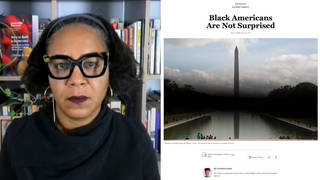
Hundreds of state legislators from all 50 states have gathered in New Orleans for the annual meeting of the American Legislative Exchange Council, known as ALEC. Critics say the Washington-based organization plays a key role in helping corporations secretly draft model pro-business legislation that has been used by state lawmakers across the country. Unlike many other organizations, ALEC’s membership includes both state lawmakers and corporate executives who gather behind closed doors to discuss and vote on model legislation. In recent months, ALEC has come under increasing scrutiny for its role in drafting bills to attack workers’ rights, roll back environmental regulations, privatize education, deregulate major industries, and passing voter ID laws. Nonetheless, this year’s annual ALEC meeting boasts the largest attendance in five years, with nearly 2,000 guests in attendance. We go to New Orleans to speak with Lisa Graves, executive director of the Center for Media and Democracy. Last month, her organization released 800 model bills approved by companies and lawmakers at recent ALEC meetings. [includes rush transcript]
Transcript
AMY GOODMAN: Hundreds of state legislators from all 50 states have gathered in New Orleans, Louisiana, for the 38th annual meeting of the American Legislative Exchange Council, also known as ALEC. The meeting’s top donor? BP, followed by R.J. Reynolds Tobacco and Takeda Pharmaceutical Company. Critics say the Washington-based group has played a key role in helping corporations secretly draft model pro-business legislation that’s been used by state lawmakers across the country.
Unlike many other organizations, ALEC’s membership includes both state lawmakers and corporate executives. At its meetings, the corporations and politicians gather behind closed doors to discuss and vote on model legislation. Before the bills are publicly introduced in state legislatures, they’re cleansed of any reference to who actually wrote them. However, the chair of ALEC, Noble Ellington, insisted in an interview with NPR’s Terry Gross that he works for the tax-paying public. Ellington is a Republican member of the Louisiana State Legislature.
REP. NOBLE ELLINGTON: We represent the public, and we are the ones who decide. So the tax-paying public is represented there at the table, because I’m there.
TERRY GROSS: I understand that, but you’re there at the table with corporations. But at the table—
REP. NOBLE ELLINGTON: Can I interrupt you again?
TERRY GROSS: Yes.
REP. NOBLE ELLINGTON: It’s not just corporations. I’m there, and members of ALEC is the Americans for Tax Reform, the National Taxpayers Union, National Federation of Independent Businesses. Those are people that we represent, as well, and those are people who are members.
TERRY GROSS: But those are—those are all pro-business, anti-tax groups. People not represented at the table include workers, union members, teachers, students—
REP. NOBLE ELLINGTON: No, ma’am. No, ma’am. You are—
TERRY GROSS: —patients, patients who can’t pay medical bills.
REP. NOBLE ELLINGTON: You are completely wrong.
AMY GOODMAN: That was, an exchange between NPR’s Terry Gross and ALEC chairman Noble Ellington.
In recent months, ALEC has come under increasing scrutiny for its role in drafting bills to attack worker rights, roll back environmental regulations, privatize education, deregulate major industries, and pass voter ID laws. Nonetheless, this year’s annual ALEC meeting boasts the largest attendance in five years, with nearly 2,000 people in attendance. The conference features speakers like, oh, Louisiana Governor Bobby Jindal, former West Virginia Governor Bob Wise, Wall Street Journal contributor Steve Moore, and the president of the American Enterprise Institute, Arthur Brooks.
Now, a new exposé in The Nation magazine called “The Hidden History of ALEC and Prison Labor” details ALEC’s instrumental role in the explosion of the U.S. prison population in the past few decades. According to the article, ALEC pioneered some of the toughest sentencing laws on the books today and paved the way for states and corporations to replace unionized workers with prison labor.
We’re joined now by the one of the reporters who wrote the article, Mike Elk, contributing editor to The Nation magazine. We’re also joined by Lisa Graves. She’s in New Orleans right now, where the ALEC conference is taking place. She’s executive director of the Center for Media and Democracy. Last month, the Center for Media and Democracy released 800 model bills approved by companies and lawmakers at recent ALEC meetings. We invited a member of ALEC to join us, but they denied our request.
Mike Elk, Lisa Graves, welcome to Democracy Now! Lisa, talk about what’s happening right now in New Orleans. Are you getting into this conference? What are you seeing? What are the seminars, these sessions about?
LISA GRAVES: Well, the Center for Media and Democracy was denied access to the convention with one of our cub reporters, and he was required to leave the convention hotel, the Marriott. But we have received reports, from behind closed doors, from those meetings, at which corporations and politicians are voting on model legislation. And one of the reports we received yesterday from insiders is that corporations vetoed model legislation that politicians had voted for. And so, it is in fact the case that politicians and corporations are voting as equals on model legislation through ALEC task forces, and corporations have the right to veto, through this process, legislation that even a majority or—a majority of politicians within those meetings would approve.
Those meetings cover every area of law, including tax, environment, workers’ rights, the rights of Americans killed or injured by corporations, as well as healthcare, pensions—you name it, basically it’s covered. And we’ve even seen coverage from inside about sessions with ALEC, in which they had one session called “Warming Up to Climate Change: How Increased CO2 Can Benefit You.”
AMY GOODMAN: I want to go back to Terry Gross of NPR speaking with the national chair of ALEC, Noble Ellington, the Republican member of the Louisiana State Legislature. Terry Gross asked Ellington why ALEC gives corporations such a big say in drafting legislation. This is an excerpt of their exchange.
TERRY GROSS: Why give corporations such a big say in drafting legislation?
REP. NOBLE ELLINGTON: Well, partly because they are one of the ones who will be affected by it. And you say “a big say,” but as I expressed to you earlier, and I think it needs to be made perfectly clear, that they have—they do not have the final say about model legislation. It is done with work with task forces, which is both public and private sector working together. But before it ever becomes model legislation or ALEC policy, it has to go through the public sector board, not the private sector. So only the public sector had the final say as to whether or not something becomes model legislation.
AMY GOODMAN: That’s the ALEC chair, Noble Ellington. Lisa Graves, your response?
LISA GRAVES: Well, it’s interesting, because what we saw and what we heard from inside yesterday is that, quite clearly, corporations can veto things before the public board that Noble Ellington sits on have a chance to approve it. So, in essence, if the corporations disagree on proposed legislation at the task force level, it never makes it to the board that Senator Ellington sits on.
The fact is that corporations exert extraordinary influence and control over this process. They can veto legislation through the task forces. They are the bankrollers of ALEC. Over 98 percent of the money that funds ALEC’s operations come from everything except for legislative dues, which are 50 bucks a year. Some legislators are so cheap, they don’t even pay it themselves; they have the taxpayer pay it for them. Meanwhile, corporations can pay $7,500 or $25,000 a year for membership, and then some corporations, like BP, a year after the disaster in the Gulf, is now the headline corporation underwriting this convention. They’re the top corporation listed in the President’s Circle for ALEC’s convention this year.
AMY GOODMAN: Taking place, of course, there in New Orleans. What has the debt deal negotiations and this whole crisis that has happened in Washington meant for this conference and for ALEC? What are they saying about it?
LISA GRAVES: Well, they haven’t—they haven’t mentioned a lot about it directly, at least in the sessions that we’ve heard reports from. However, we do know that Governor Jindal spoke sort of extensively about the power of being stubborn, the importance of being stubborn and the power of that, which I think was a direct reference to the debt negotiations. The fact is that ALEC alums include Congressman John Boehner, who’s the speaker of the House, as well as Congressman Eric Cantor, who’s the Republican leader of the House. ALEC legislation parallels legislation that has been introduced in the U.S. House of Representatives to cap spending by government, to reduce taxes on the richest of Americans and the richest corporations, and so that agenda is moving both through Congress and through the states, and it’s an agenda whose ideas are made concrete through model legislation that ALEC produces every year. These politicians who sit on the board with Senator Ellington and others, they have approved over 850 pieces of legislation or resolutions, that we’ve made available to the public and have analyzed, and that the public is joining us, along with reporters, in analyzing. And so, we know what this agenda looks like. It looks like the same sort of deal that was pushed through in Congress this week.
AMY GOODMAN: Lisa Graves, the significance of holding this conference in post-Katrina New Orleans? I mean, you’ve talked about BP sponsoring it—of course, the huge BP oil spill. But also, all the teachers fired in New Orleans. It’s known as a Petri dish for policy in this country, and not as many people may be aware—as aware of that.
LISA GRAVES: Well, that’s right. Well, on the one hand, we certainly are happy to see money coming into the New Orleans—the New Orleans economy, even from a convention like ALEC’s, where these corporations and politicians are engaged in this sort of unprecedented joint voting.
The fact is that we had a press conference earlier this week with local school board representatives, including a Republican on the school board, as well as local teachers, who have talked about the failure of policies that basically privatize public education in New Orleans to push money out of the public school system into not-well-regulated charter schools, charter schools that have had severe problems, and how those policies have failed at the ground-floor level here in New Orleans. People who were part of that conference said they wondered where the push was coming for these proposals to just massively change the school system. It turns out these proposals are echoed in ALEC legislation that’s being pushed across the country. It’s a one-size-fits-all, McBill sort of factory within ALEC, and it serves the interests of ALEC corporations, including the ALEC Education Task Force, which is co-chaired by an online school company, a for-profit company.
AMY GOODMAN: Is there anything else you think is critical to understand about this organization that not that many people know about by name, ALEC, but may know about by laws that are passed in their states, with them not knowing where they are coming from?
LISA GRAVES: Well, we think that fellow reporters and citizens can make a lot of use of our website, alecexposed.org. We have lists of politicians. We’ve added over a thousand politicians over the past few weeks since the site was launched. We have profiles and links to profiles on some of the corporations that are the leading players within ALEC, including Koch Industries. And we also are discovering new corporations every day. For example, today, Dick Armey, who is the leader of FreedomWorks, who basically is one of the leaders of the Tea Party effort, is speaking at a luncheon, and that is sponsored by Visa. I say to Visa: “Not priceless.” The fact is that what we’re seeing here is an extraordinary influence of corporations on our policy. And we do know—and I would say, with respect to your next segment, we understand from other reporters that ALEC is denying that the Corrections Corporation of America is a member or leader of ALEC, but we have proof that Corrections Corporation of America, which has been involved in pushing this prison privatization agenda, was a member of ALEC as of at least last month.
AMY GOODMAN: Well, I want to thank you very much for being with us. “The Hidden History of ALEC and Prison Labor” is our next segment. Lisa Graves, of the Center for Media and Democracy, in New Orleans.












Media Options